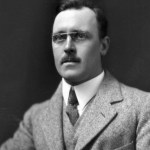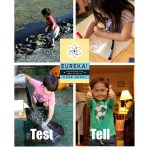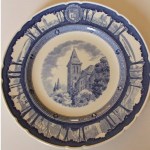Books
"You wanted to see me, Herr Professor?"
"Hans! Yes, come in, come in. Just going over the account books. Frightful amount of money going out of this place."
"Well, radium is expensive..."
"Ha! Oh, and speaking of which-- here's one of the sources. Absent-mindedly dropped the fool thing in my pocket last night when I locked up. Terrible habit, I really must work on that. Had a drawer full of the things in Montreal..."
"Thank you. And you wanted to see me about...?"
"Oh, yes. We have a new student, Hans, and I'd like you to put him to work on the gold foil project."
"Shouldn't he have his own…
Over at Medium, they've published a long excerpt from Eureka: Discovering Your Inner Scientist, that gives a good flavor of what the book's really like. It's about how the process for solving hidden-object games like the classic Where's Waldo books is comparable to the process used by Henrietta Leavitt to revolutionize our understanding of the universe:
There are multiple web sites and academic papers devoted to computer algorithms for locating Waldo within Handford’s drawings, using a variety of software packages, and these are impressively complex, running to hundreds of lines of code and…
"...and take care that all the signatures go in the right way round, eh, James? I was able to soothe Mr. Dance last time, but if another copy comes back to be rebound, M. de la Roche will put you out."
"Yessir."
"A little more care, there's a good lad. Run home, now, we'll see you in the morning." The apprentice scurried off.
The journeyman bookbinder checked again that the shop door was securely closed, pulled his coat tighter against the March chill, and turned to make the short walk to his own meagre rooms. Stuffing his hands in his pockets, he felt the folded pamphlet advertising tonight…
A few items for Sunday morning:
-- First and foremost, in just a few hours from now, I'll be signing books at the Open Door. If you're in Quebec or central Pennsylvania, you better leave now; Boston or NYC, you can have a cup of coffee first. Farther than that, you might try calling them around 11am ET to see if they'll ship you one...
-- The Albany Times Union did a short Q&A with me about the book. This ran Thursday, apparently, but didn't show up on Google, so I only found it this morning when I went to the Times Union site directly.
-- There's a good, thoughtful review in the…
One of the questions from a caller when I was on the "Think" show was about how to keep kids interested in science. As I said, the issue isn't so much creating in interest as working to not squelch the interest that's already there. Taking kids to cool places like zoos and science museums is a great way to do that, and just generally encouraging them to ask questions and try things out.
But if you'd like some more specific gift ideas, here's a selection of science-y things that SteelyKid and The Pip enjoy that you might try out on other kids of your acquaintance:
-- Magna-Tiles These. Are.…
Last week Kate pointed me to this post about heroic stories of science saying "This seems relevant to your interests." And, in fact, a good deal of the post talks about Patricia Fara's Science: A Four Thousand Year History, the Union library's copy of which is sitting on my desk, where I had looked something up in it just that morning. (Specifically, the part where Fara notes that the distinction between "science" and "technology" is largely a class-based fiction, dividing high-status philosophers from grubby practical mechanics.)
There are a bunch of things going on in this, and most of them…
I've been trying to keep to a roughly chronological ordering of these stories, but this slow-motion snow storm that was waiting to greet us on our return from Florida made the schools open on a two-hour delay today, which eats the time I usually use for blogging and books stuff. So I'm going to jump forward three hundred years, to a story that I can outsource.
To set the stage, in the aftermath of WWII, Richard Feynman took up a faculty job at Cornell, but between working on the Manhattan Project and the death of his beloved wife, he found that he was completely burned out, and not able to do…
Yesterday, I drove through the slush to Albany to do an appearance on KERA radio's "Think" from a studio there. The audio is at that link.
It was a bit of a strange experience, because I drove to a place to do the interview in a radio studio, but I was the only one in the room, taking questions from a disembodied voice. I enjoyed it, though, and the audio quality is a lot better than you would've gotten from even a land-line phone. This was a live show, including some call-in questions, and that always has a working-without-a-net quality that is kind of exciting. I got in a bunch of stories…
The final step of the scientific process is to share your results with others, and that's the step where things are most prone to breaking down. Countless great discoveries have been delayed or temporarily lost because the people who made them were more concerned with protecting "their" secrets than with sharing new knowledge with the world. A classic example of this, that I first heard from Michael Nielsen, is Robert Hooke in 1676 first reporting the relationship for elastic forces as "ceiiinossssttuv," which unscrambles to "ut tensio, sic vis," indicating that the force is proportional to…
So, you've picked up your copy of the just-released Eureka: Discovering Your Inner Scientist-- you have bought a copy, right?-- and now you're thinking "I'd love to curl up and read this, but what should I listen to while I do that?"
Well, never fear, I'm here to help. Also, I'm really tired, and this seems like a quick and easy blog post... Anyway, here are some of the crucial records involved in the making of this book.
1) Teeth Dreams by the Hold Steady This was probably the most crucial album of the lot, because it came out just at the time I needed to power through a whole bunch of edits…
Today is the official release date for Eureka: Discovering Your Inner Scientist, so of course there are a bunch of exciting things happening:
-- There's a short excerpt at the Science of Us blog from New York Magazine. This is a chunk of the Introduction, about how scientists are smart, but not that smart.
-- I wrote a Big Idea essay at Whatever, talking about how this book is about the BIGGEST idea in the history of humanity. Which is only a tiny bit of hyperbole.
-- Rosemary Kirstein included Eureka as a gift suggestion, which is very cool, as she writes awesome books. You should check them…
Spent the weekend in Florida getting together with some friends from college, which was a much-needed recharge for me at the end of a brutal term. It's probably fitting to ease back into routine with a return to my blogging roots, and talk a bit about a book. Specifically, the new William Gibson novel, The Peripheral.
I haven't actually read any reviews of this, because I don't really need to read reviews to know that I want to read a new Gibson-- he's that significant a writer. His work needs the proper context, though-- while I technically started this a week or two ago as bedtime reading,…
The first time you hear about dark matter, it sounds kind of crazy-- asserting that we're surrounded by tons of invisible stuff is usually a good way to get locked up. But the process of its discovery is surprisingly ordinary: it's just what you do when you play cards.
Here's the second green-screen video I've done to promote Eureka: Discovering Your Inner Scientist, which comes out three weeks from tomorrow (but can be pre-ordered today!). This one is about card games, modern astrophysics, and why you probbaly shouldn't play bridge against Vera Rubin:
For those who dislike video, I'll put…
I enjoyed Caleb Scharf's previous book, Gravity's Engines a good deal, so I was happy to get email from a publicist offering me his latest. I'm a little afraid that my extreme distraction of late hasn't really treated it fairly, but then again, the fact that I finished it at all in my current state of frazzlement may be the best testament I can offer to its quality. This is a sweeping survey of what we've learned about our place in the universe over the last five hundred years or so.
Now, a grandiose description like that often portends a bunch of wifty philosophizing that poses grand…
The exciting news of the week: Eureka: Discovering Your Inner Scientist has gotten a starred review in Publishers Weekly. Woo-hoo!
They've said nice things about my previous two books, but getting the star is a big deal. And it's a really good capsule description of the book, with a great pull quote in the last sentence:
This fun, diverse, and accessible look at how science works will convert even the biggest science phobe.
Really, I can't ask for better than that.
I found out this was coming at the end of last week, where it was an absolute life-saver after some sanity-threatening stuff…
Eureka: Discovering Your Inner Scientist has officially been sent to the printers, so we're at the phase of things where I don't have anything to do but think about publicity. There are some reviews forthcoming, at least one of which I'm very happy about, but I'll share more about that when it becomes public. I've also picked up some nice blurbs from very smart folks:
"I know, I know, you think you're just not smart enough to be a scientist. Chad Orzel might convince you otherwise with Eureka. Drawing on basketball, stamp collecting, Angry Birds, Iron Chef, and Antiques Roadshow among his…
I get a fair number of books to review, but I'm often pretty bad about writing them up in a timely manner. Of course, most of them are well over 70 pages long, which is why I've managed to turn around Roberto Trotta's The Edge of the Sky: All You Need to Know About the All-There-Is in the course of a weekend.
As you can probably get from the title, this is a book about astronomy written in Up Goer Five style, using only the thousand most common English words (which are helpfully listed near the start of the book, in case you want to check whether he cheated...), plus proper names. And there'…
My bedtime reading for the past week or so has been Steven Gould's Exo (excerpt at Tor). This is the fourth book in the Jumper series (not counting the movie tie-in novel), and ordinarily wouldn't be worth much of a review, because if you haven't read the first three, this book won't make a lick of sense. If you have read the others, it's a worthy sequel, but three earlier books makes for a lot of backstory to explain in writing the book up.
It's worth noting, though, because it belongs to a sort of unofficial subgenre: books about Working Things Through. The story includes a huge amount of…
I got a royalty statement yesterday for How to Teach [Quantum] Physics to Your Dog (it continues to sell steadily, which is very gratifying), which includes a breakdown of the sales in terms of different formats. That reminded me of a particular annoying quirk of many recent discussions of the state of modern publishing, which is the often unsupported assertion that everything is ebooks these days, and paper books (and book stores) are just a small residual element that publishers and authors cling to out of historical affection.
Since I happen to have my royalty statements in front of me,…
Three weeks in Europe means a lot of time on planes and trains, so I actually got to read some fiction for a change. I'm stuck in a meeting all day today, and need a morale boost on the way in, so I'll go back to my book-blogging roots and type up the books that I read:
-- Lev Grossman, The Magician's Land. Conclusion of the trilogy begun with The Magicians back in the day, and while it's a better book than the first one, if you didn't like the first book, you probably won't like this. Mostly because of the characters, who are very much a like-them-or-hate-them crew.
Personally, I think it's…





